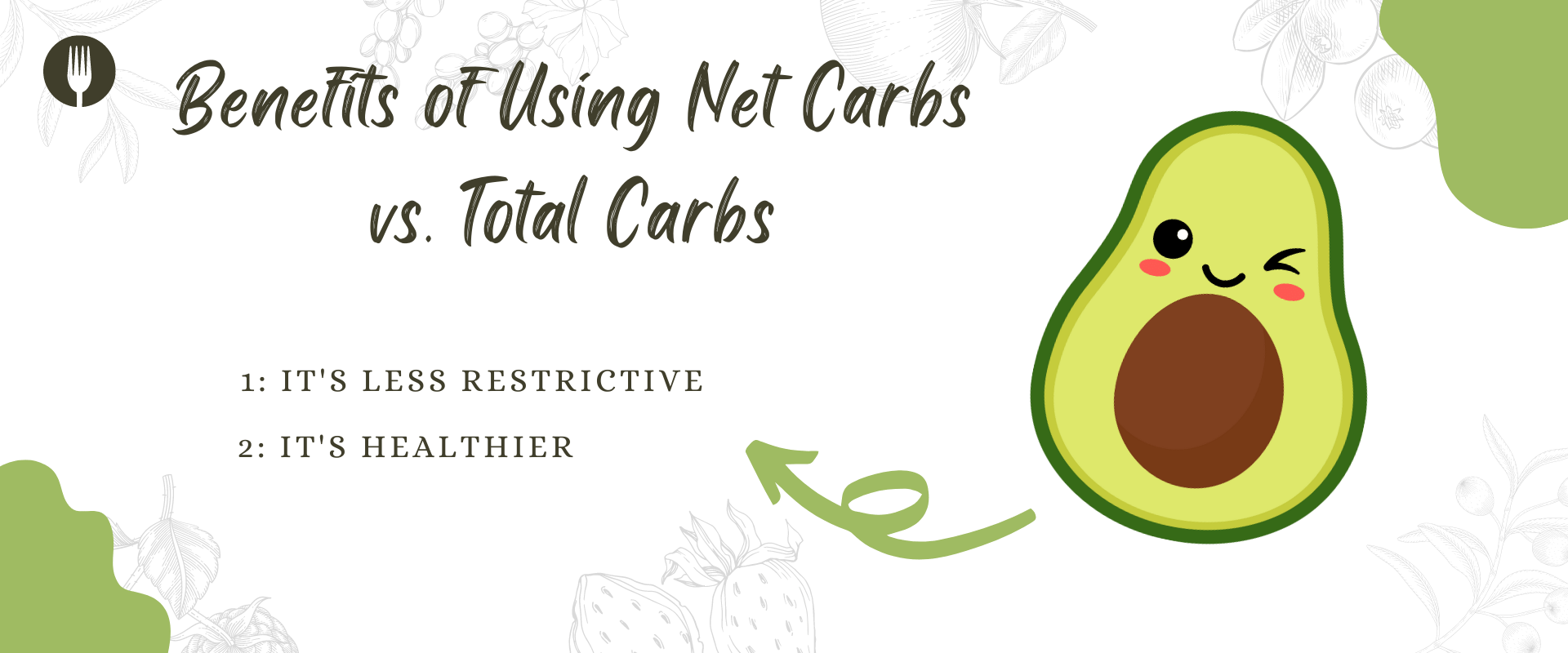Net carbs are the most perplexing subject among Keto dieters. Let’s get this straight.
Yes, carbohydrates must be limited on the Keto diet. However, you do not have to restrict all carbohydrates.
For example, because fiber does not boost blood sugar, you do not need to limit it. As a result, net carbohydrates do not contain fiber carbs.
On Keto, your North Star is net carbohydrates. They are the only carbohydrates that matter.
So, how do you figure out your net carbs? What is the difference between net carbohydrates and total carbs? And how can you quickly and successfully measure net carbohydrates on Keto? Continue reading.
What are Net Carbs?
Net carbs are carbohydrates that boost blood sugar levels. They’re known as Keto Kryptonite: they throw you out of ketosis.
The three major types of net carbs are:
- Simple carbs (glucose, fructose, lactose)
- Complex carbs (dextrin and cellobiose)
- Starches (chains of glucose)
“Carby” foods include a lot of net carbohydrates. Examples are pasta, bread, cereals, fruits, starchy veggies, and table sugar.
Do you want to learn how to calculate net carbs? Combine the three categories. Net carbs = simple carbs + complex carbs + starches.
But that is impractical. Carbohydrates are not delineated on food labels in this manner.
The practical technique begins with total carbohydrates and then subtracts nonglycemic carbs. Here’s how it works:
- Net carbs = total carbs – fiber – sugar alcohols
That’s all. Deduct fiber and sugar alcohols from total carbohydrates.
Net Carbs vs. Total Carbs
People frequently need to remember the distinction between net carbs and total carbs. Why? Because most people on Keto talk about restricting carbs (not net carbs).
Limiting your carbohydrate intake to 20 grams per day draws your attention to the “total carbs” section of the recipe. Carbs are carbohydrates.
Wrong. Say it with me: the only carbs that count on Keto are net carbs.
Make it into a shower tune. “The only carbs that matter are net carbs!” (As a bonus, your housemates will receive a free Keto macro instruction.)
To demonstrate, consider the avocado, a Keto mainstay.
11.7 grams of total carbs are found in one California avocado. That is a lot of carbohydrates until you consider that 9.2 grams of those carbs are fiber carbs.
Do the math. 11.7 grams total carbs – 9.2 grams fiber – 0 grams sugar alcohols = 2.5 grams net carbs. Keto approved!
Fiber and Sugar Alcohols: Why They Don’t Count
Fiber and sugar alcohols are not counted since they are nonglycemic, so they do not raise blood sugar levels. But how come they’re nonglycemic?
Because they are not metabolized like other carbs, they pass through the colon intact instead of breaking down into glucose, diffusing through the small intestine, and raising blood sugar levels.[1][2]
Gut microbes are waiting for you. They break down fiber and sugar alcohols, producing helpful short-chain fatty acids (such as butyrate) and, depending on your gut health, flatulence.[3]
Fiber and sugar alcohols are nutrients for gut bacteria, not human cells. That is why they are not counted.
How Many Net Carbs on Keto?
Carbohydrates must be kept low on the Keto diet. Maintaining low blood sugar and insulin levels promotes the fat-burning state of ketosis. [4]
The advantages of the Keto diet are supported by ketosis. Ketosis is often associated with weight loss, appetite management, improved cognition, decreased inflammation, and other positive effects.
However, as you’ve seen, you don’t have to restrict all carbohydrates to enter ketosis. Only carbohydrates that boost blood sugar and insulin levels should be avoided.
You restrict net carbohydrates. Fiber and sugar alcohols are OK.
Your own goals will determine your net carb limit. If you’re taking Keto for medicinal purposes—to control epilepsy—you’ll want to maintain net carbohydrates close to zero.
Most people, though, are more adaptable. Maintaining net carbs around 5-10% of daily calories (15-30 grams) is an excellent place to start.
Remember, you don’t have to be in therapeutic ketosis to benefit from the Keto diet. A little kind of nutritional ketosis will suffice.
Should you also keep track of total carbs? That will only make problems worse. (You’ll begin to fear nutritious, fiber vegetables.)
Just keep track of your net carbohydrates. There is just one carb metric that rules them all.
Benefits of Using Net Carbs vs. Total Carbs
Tracking net carbs will help you do better on Keto. This is why.
#1: It’s less restrictive
You can consume avocados, berries, almonds, and many low-carb vegetables if you restrict yourself to 20 grams of net carbs daily. The possibilities for recipes are limitless.
However, with a total carb allowance of 20 grams, your alternatives are limited—goodbye, fruits, veggies, and nuts.
Fortunately, you are not required to do so. And if your friends are making the same mistake, forward this post to them.
#2: It’s healthier
Grandma was correct: vegetables are healthy! You miss out on several essential micronutrients if you don’t consume them, and there are many low-carb veggies to pick from.
Fruits (especially low-carb varieties) and nuts are also beneficial. They have a high fiber (total carbohydrates) but a low net carb content.
Most people would benefit from eating more fiber. Higher fiber consumption, for example, has been related to improved digestive and cardiovascular health. [5][6] (Note: People with persistent digestive disorders, such as IBS or IBD, may do better on a low-fiber diet.. Pay attention to your body.)
What’s the bottom line? Net carb Keto ensures that nutrient-dense foods remain in your diet. Total carbohydrate Keto does not.

Using Carb Manager to Track Net Carbs
It’s helpful to understand net carb calculations, but don’t get too caught up in the numbers. Carb Manager includes a net carb calculator.
Set your net carb target (configurable in settings at any moment), then chronicle your meals.
Do you want to know whether you’re getting close to your net carb limit? Go to the “Link here to get access.”
It’s an easy and quick way to track net carbs. Congratulations, your Keto diet has just become more straightforward.







0 Comments